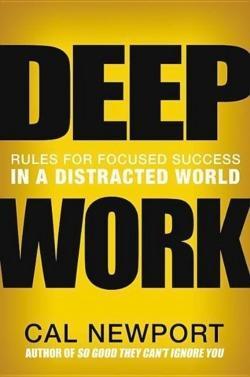Snake Gaming ha recensito Deep Work di Cal Newport
Review of 'Deep Work' on 'Goodreads'
1 stella
Cal.
Pal.
Bud.
This book bout cutting off what's unnecessary is full of unnecessary fluff. Part One is literally ''here's a bunch of capitalists who did it'', Part Three is a veeeery long rumble about how Internet bad social media bad meet the people you love face to face [quite hard if you live very far apart for work or study, which is very likely if you're reading this book] [even harder now that WE'RE ALL ON LOCKDOWN YOU ABSOLUTE UNIT] and Part Four is basically all of the other parts repeated again.
There's also a recurring hatre for emails.
Cal.
Pal.
You know some people's work is pretty much answering e-mails, right? Not everyone is an intellectual like you, some people work in PR. If you, as many people do, delegate e-mails to someone else, that person's job becomes the ''shallow work'' you despise so much, which then becomes their ''deep work'' .
This entire book can be summarized as such
1. when you work, have no distractions, no TV, social media, no e-mails. As we say in Italy, you discovered hot water, Cal
2. schedule day by day what to do, focusing when to work and reaxing in gentle manners like reading or listening to music. Again, Cal, hot water
3. avoid overworking and working after hours/in the evening because you're likely already drained of all energy [basically the only decent advice] and
4. avoid aimlessly looking at your social media feed, hot water number three
5. be rich and successful or strive to become rich and successful because that's what matters, right?
Part Two is the only part you should actually read, the section about the different variations of deep work was the most illuminating: there's monastic [completely isolate yourself and avoid digital contacts to work all the time you can, feasible only if you're already rich and your work doesn't require contact with people, aka novelists], bimodal [go on long periods of time, no less than one day, in deep work, followed by long periods of being a regular person and socializing, again, feasible only if you're already rich and need to meet people anyway, like a college professor or a medical professionist], rhytmic [schedule a few hours, no more than four and better if it's at least two, for deep work every day, aka the one most people can do and he suggests it, even suggesting you start with just one hour per day to train your brain into deep focus] and journalistic [do deep work every time you have an available slot that isn't filled with meetings or social events, even if it's just a quarter of hour, the other one that could be available to everyone but harder to achieve since it requires being already able to focus almost immediately].
That's it, that's the book. I could have spent this time, you know, deep working, but I read this instead. Thanks, Cal, you told me stuff my grandma who died 13 years ago already knew. Your shallow book ultimately wasted my time.

